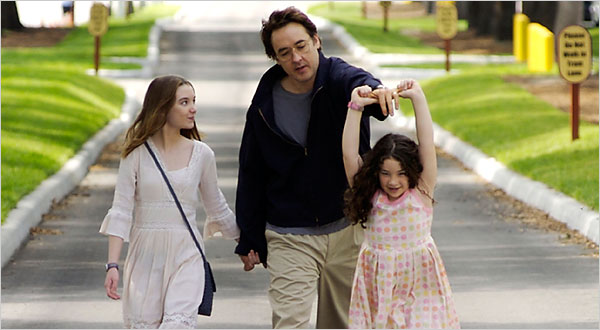|
Reviews of Recent Independent, Foreign, & Documentary Films in Theaters and DVD/Home Video
Written & Directed by James C. Strouse. Produced by John Cusack, Grace Loh, Galt Niederhoffer, Daniela Taplin Lundberg & Celine Rattray. Written by James C. Strouse. Director of Photography, Jean-Louis Bompoint. Edited by Joe Klotz. Music by Clint Eastwood (yes, that Clint Eastwood). Released by: The Weinstein Company. USA 85 min. Rated PG-13. With John Cusack, Alessandro Nivola, Gracie Bednarczyk, Shélan O'Keefe, Katie Honaker & Mary Kay Place. When Stanley Phillips (John Cusack) suggests an impromptu trip to a Florida amusement park, his two young daughters can’t believe their luck. What they don’t know is that their Army mom has just been killed in Iraq, and their dad – a disheartened housewares salesman with thwarted military dreams – is too distraught to tell them. Grace is Gone plays out like a sentimental journey through three distinct issues: grief, father/daughter dynamics, and the Iraq war. Although they integrate neatly into this narrow storyline, director and screenwriter James C. Strouse presents them as rigidly as an outline for a sixth grade book report, making no secret of what he’s trying to say. The road trip to Enchanted Gardens – an appropriate destination for a vacation predicated on denial – serves as a conveyor belt for the film’s main ideas. When Stanley hypnotically returns to his parent’s house, looking for guidance or support, Strouse engages him in a shallow political debate with his lefty out-of-work brother (Alessandro Nivola). While the liberal stumbles over the most rudimentary objections to the war, murmuring something about our two-faced politicians, Stanley the patriot proclaims blind loyalty to the cause, perhaps less out of conviction than a need to rationalize his wife’s death. Back in the car, Strouse shifts his focus to the rarely explored awkwardness between father and daughters, a tension that makes it difficult for Stanley to talk to them about anything, much less about their mother’s death. This subtle facet of familial relationships is the cleverest aspect of the film. Casting John Cusack is a close second. This golden boy of lighthearted comedies immerses himself so thoroughly in the skin of a dejected, provincial “housewife,” he might as well be wearing a disguise. Like a limber capoeirista, he deftly fights a private battle with grief in the confines of his grimaces and drooping gait. His execution of denial is classic enough for a psych 101 class but nuanced enough to be heart wrenching.
Cusack’s tender role and the girls’ spirited, almost improvised performances justify the tears elicited by the tragic plot. Despite the film’s
limitations and in-your-face subject matter, overall, I didn’t feel exploited by a crude serving of death and sunsets. Like Stanley’s heartbreaking
voicemail to his dead wife, Grace is Gone is at times moving and sincere. At other moments, Strouse maneuvers the film like a heavy-handed
puppeteer, and I couldn’t help but be distracted by the strings.
Yana Litovsky
|

